Braid Representatives: Difference between revisions
No edit summary |
No edit summary |
||
| Line 59: | Line 59: | ||
<!--END--> |
<!--END--> |
||
{{Knot Image|K11a362|gif}} |
{{Knot Image Pair|T(5,4)|jpg|K11a362|gif}} |
||
<code>KnotTheory`</code> has the braid representatives of some knots and links pre-loaded, and for all other knots and links it will find a braid representative using Vogel's algorithm. Thus for example, |
<code>KnotTheory`</code> has the braid representatives of some knots and links pre-loaded, and for all other knots and links it will find a braid representative using Vogel's algorithm. Thus for example, |
||
| Line 84: | Line 84: | ||
(As we see, Vogel's algorithm sometimes produces scary results. A <!--$Crossings[BR[Knot[11, Alternating, 362]]]$--><!--Robot Land, no human edits to "END"-->51<!--END-->-crossings braid representative for an 11-crossing knot, in the case of [[K11a362]]). |
(As we see, Vogel's algorithm sometimes produces scary results. A <!--$Crossings[BR[Knot[11, Alternating, 362]]]$--><!--Robot Land, no human edits to "END"-->51<!--END-->-crossings braid representative for an 11-crossing knot, in the case of [[K11a362]]). |
||
{{Knot Image|10_1|gif}} |
|||
The ''minimum braid representative'' of a given knot is a braid representative for that knot which has a minimal number of braid crossings and within those braid representatives with a minimal number of braid crossings, it has a minimal number of strands (full details are in {{ref|Gittings}}). Thomas Gittings kindly provided us the minimum braid representatives for all knots with up to 10 crossings. Thus for example, the minimum braid representative for the knot [[10_1]] has length (number of crossings) 13 and width 6 (number of strands, also see [[Invariants from Braid Theory]]): |
The ''minimum braid representative'' of a given knot is a braid representative for that knot which has a minimal number of braid crossings and within those braid representatives with a minimal number of braid crossings, it has a minimal number of strands (full details are in {{ref|Gittings}}). Thomas Gittings kindly provided us the minimum braid representatives for all knots with up to 10 crossings. Thus for example, the minimum braid representative for the knot [[10_1]] has length (number of crossings) 13 and width 6 (number of strands, also see [[Invariants from Braid Theory]]): |
||
Revision as of 02:20, 3 September 2005
Every knot and every link is the closure of a braid. KnotTheory` can also represent knots and links as braid closures:
(For In[1] see Setup)
|
| ||||||||
| ||||
Thus for example,
In[4]:=
|
br1 = BR[2, {-1, -1, -1}];
|
In[5]:=
|
PD[br1]
|
Out[5]=
|
PD[X[6, 3, 1, 4], X[4, 1, 5, 2], X[2, 5, 3, 6]]
|
In[6]:=
|
Jones[br1][q]
|
Out[6]=
|
-4 -3 1
-q + q + -
q
|
In[7]:=
|
Mirror[br1]
|
Out[7]=
|
BR[2, {1, 1, 1}]
|
 T(5,4) |
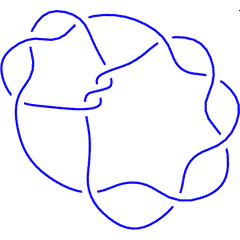 K11a362 |
KnotTheory` has the braid representatives of some knots and links pre-loaded, and for all other knots and links it will find a braid representative using Vogel's algorithm. Thus for example,
In[8]:=
|
BR[TorusKnot[5, 4]]
|
Out[8]=
|
BR[4, {1, 2, 3, 1, 2, 3, 1, 2, 3, 1, 2, 3, 1, 2, 3}]
|
In[9]:=
|
BR[Knot[11, Alternating, 362]]
|
Out[9]=
|
BR[10, {1, 2, -3, -4, 5, 6, 5, 4, 3, -2, -1, -4, 3, -2, -4, 3, 5, 4,
-6, 7, -6, 5, 8, 7, 6, 5, -4, -3, 2, 5, -6, 9, -8, 7, -6, 5, 4, -3,
5, 6, 5, 4, 5, -7, 8, -7, 6, 5, -9, -8, -7}]
|
(As we see, Vogel's algorithm sometimes produces scary results. A 51-crossings braid representative for an 11-crossing knot, in the case of K11a362).
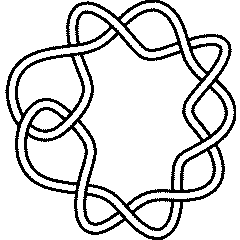 10_1 |
The minimum braid representative of a given knot is a braid representative for that knot which has a minimal number of braid crossings and within those braid representatives with a minimal number of braid crossings, it has a minimal number of strands (full details are in [Gittings]). Thomas Gittings kindly provided us the minimum braid representatives for all knots with up to 10 crossings. Thus for example, the minimum braid representative for the knot 10_1 has length (number of crossings) 13 and width 6 (number of strands, also see Invariants from Braid Theory):
In[10]:=
|
br2 = BR[Knot[10, 1]]
|
Out[10]=
|
BR[6, {-1, -1, -2, 1, -2, -3, 2, -3, -4, 3, 5, -4, 5}]
|
In[12]:=
|
Show[BraidPlot[CollapseBraid[br2]]]
|
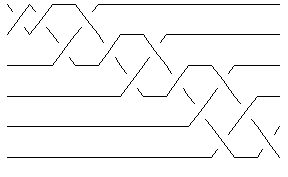
| |
Out[12]=
|
-Graphics-
|
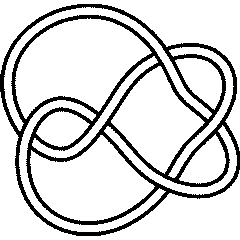 5_2 |
Already for the knot 5_2 the minimum braid is shorter than the braid produced by Vogel's algorithm. Indeed, the minimum braid is
In[14]:=
|
Show[BraidPlot[CollapseBraid[BR[Knot[5, 2]]]]]
|
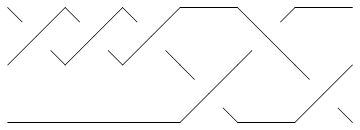
| |
Out[14]=
|
-Graphics-
|
To force KnotTheory` to run Vogel's algorithm on 5_2, we first convert it to its PD form,
In[15]:=
|
pd = PD[Knot[5, 2]]
|
Out[15]=
|
PD[X[1, 4, 2, 5], X[3, 8, 4, 9], X[5, 10, 6, 1], X[9, 6, 10, 7],
X[7, 2, 8, 3]]
|
and only then run BR:
In[17]:=
|
Show[BraidPlot[CollapseBraid[BR[pd]]]]
|
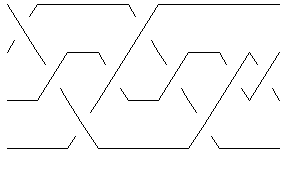
| |
Out[17]=
|
-Graphics-
|
(Check Drawing Braids for information about the command BraidPlot and the related command CollapseBraid.)
[Gittings] ^ T. A. Gittings, Minimum braids: a complete invariant of knots and links, arXiv:math.GT/0401051.